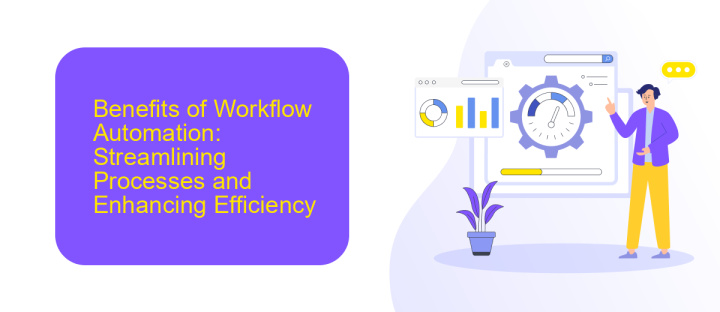Benefits of Workflow Automation
In today's fast-paced business environment, workflow automation has become a game-changer for organizations of all sizes. By streamlining repetitive tasks and processes, it not only enhances efficiency but also reduces errors and operational costs. This article explores the numerous benefits of workflow automation, highlighting how it can transform the way businesses operate and achieve their objectives more effectively.
Introduction: Defining Workflow Automation and Its Importance
Workflow automation refers to the technology-driven process of streamlining and automating repetitive tasks and business processes. This can significantly improve efficiency, reduce human error, and free up valuable time for employees to focus on more strategic activities.
- Enhanced productivity by automating routine tasks.
- Improved accuracy and reduced errors.
- Cost savings through optimized resource allocation.
- Better compliance and audit trails.
- Increased employee satisfaction by eliminating mundane tasks.
One of the key aspects of workflow automation is the integration of various software and tools to create a seamless workflow. Services like ApiX-Drive facilitate these integrations, allowing businesses to connect different applications without the need for extensive coding. By leveraging such tools, organizations can create more cohesive and efficient workflows, ultimately driving better business outcomes.
Benefits of Workflow Automation: Streamlining Processes and Enhancing Efficiency

Workflow automation significantly streamlines processes by eliminating repetitive tasks and reducing the potential for human error. By automating routine activities, businesses can ensure consistency and accuracy, leading to more reliable outcomes. This efficiency allows employees to focus on more strategic tasks, fostering innovation and improving overall productivity. For instance, tools like ApiX-Drive facilitate seamless integration between various applications, further enhancing operational efficiency by automating data transfers and synchronizations.
Moreover, workflow automation enhances efficiency by providing real-time monitoring and analytics. Automated systems can track performance metrics and generate reports, enabling managers to make informed decisions quickly. This visibility into workflows helps identify bottlenecks and areas for improvement, ensuring continuous optimization. The use of platforms like ApiX-Drive simplifies the integration process, allowing businesses to connect and automate their tools without extensive technical knowledge, thus accelerating the implementation of automated workflows.
Improved Productivity and Reduced Costs: Automating Repetitive Tasks

Implementing workflow automation can significantly boost productivity and reduce operational costs by automating repetitive tasks. By eliminating manual processes, employees can focus on higher-value activities, leading to increased efficiency and job satisfaction.
- Reduced Human Error: Automation ensures tasks are completed accurately and consistently.
- Time Savings: Automating routine tasks frees up valuable time for more strategic work.
- Cost Efficiency: Reducing the need for manual labor cuts down on operational expenses.
- Scalability: Automated systems can handle increased workloads without additional staffing.
For seamless integration of various tools and services, platforms like ApiX-Drive can be invaluable. ApiX-Drive enables businesses to connect different applications effortlessly, ensuring a smooth and efficient workflow. By leveraging such integrations, companies can further streamline processes and enhance overall productivity.
Enhanced Collaboration and Communication: Breaking Down Silos and Fostering Teamwork

Workflow automation significantly enhances collaboration and communication within teams by breaking down silos and fostering a more cohesive work environment. When repetitive tasks are automated, employees have more time to focus on strategic activities that require teamwork and creative problem-solving.
By integrating various tools and platforms through services like ApiX-Drive, teams can seamlessly share information and updates, ensuring everyone stays on the same page. This connectivity reduces misunderstandings and eliminates the delays caused by manual data entry and fragmented communication channels.
- Real-time information sharing across departments
- Automated notifications and updates
- Centralized data access
- Streamlined project management
Ultimately, workflow automation promotes a culture of transparency and collaboration. By leveraging tools like ApiX-Drive for integrations, teams can work more efficiently and cohesively, driving better outcomes and fostering a more innovative and supportive work environment.
Increased Data Accuracy and Improved Compliance: Minimizing Errors and Ensuring Consistency
Implementing workflow automation significantly enhances data accuracy by minimizing human errors that commonly occur during manual data entry and processing. Automated systems ensure that data is consistently captured, processed, and stored according to predefined rules and standards. This consistency not only reduces the likelihood of errors but also ensures that data remains reliable and accurate over time. For instance, tools like ApiX-Drive can streamline data integration across various platforms, ensuring that information flows seamlessly without discrepancies.
Moreover, workflow automation plays a crucial role in improving compliance with industry regulations and internal policies. Automated processes can be designed to adhere strictly to compliance requirements, thereby reducing the risk of non-compliance and associated penalties. By automating routine compliance checks and documentation, organizations can maintain a consistent and auditable record of compliance activities. This not only simplifies regulatory reporting but also provides peace of mind, knowing that all operations are conducted within the legal and policy frameworks.


FAQ
What are the primary benefits of workflow automation?
How does workflow automation improve accuracy and reduce errors?
Can workflow automation be integrated with existing software and tools?
How does workflow automation impact employee productivity?
Is workflow automation suitable for small businesses?
Routine tasks take a lot of time from employees? Do they burn out, do not have enough working day for the main duties and important things? Do you understand that the only way out of this situation in modern realities is automation? Try Apix-Drive for free and make sure that the online connector in 5 minutes of setting up integration will remove a significant part of the routine from your life and free up time for you and your employees.

